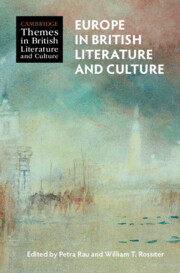Book contents
- Europe in British Literature and Culture
- Cambridge Themes in British Literature and Culture
- Europe in British Literature and Culture
- Copyright page
- Contents
- Illustrations
- Contributors
- General Editor’s Preface
- Acknowledgements
- Introduction
- Part I Zones of Influence
- Chapter 1 The Mediterranean
- Chapter 2 France
- Chapter 3 Central Europe
- Chapter 4 Ireland
- Chapter 5 Scandinavia
- Chapter 6 The Balkans and Ruritania
- Part II Pan-European Moods and Movements
- Part III Cultural Transfers
- Part IV Anxious Neighbourhoods, Uncertain Futures
- Index
Chapter 2 - France
from Part I - Zones of Influence
Published online by Cambridge University Press: 06 June 2024
- Europe in British Literature and Culture
- Cambridge Themes in British Literature and Culture
- Europe in British Literature and Culture
- Copyright page
- Contents
- Illustrations
- Contributors
- General Editor’s Preface
- Acknowledgements
- Introduction
- Part I Zones of Influence
- Chapter 1 The Mediterranean
- Chapter 2 France
- Chapter 3 Central Europe
- Chapter 4 Ireland
- Chapter 5 Scandinavia
- Chapter 6 The Balkans and Ruritania
- Part II Pan-European Moods and Movements
- Part III Cultural Transfers
- Part IV Anxious Neighbourhoods, Uncertain Futures
- Index
Summary
This chapter examines elements of French-language culture in Britain between the twelfth and the fifteenth centuries which reveal the cross-Channel ties fostered by a shared language. It focuses on the Anglo-Norman Prose Brut (ANPB), part of a medieval historiographical tradition charting British history from its origins to the contemporary era, considering it alongside related texts such as Wace’s Brut and the Roman des Franceis of André de Coutances. Surviving in over fifty manuscripts, along with more than 200 copies in English translation, the ANPB influenced the development of English historical consciousness up to and beyond the time of John Milton. The shifting of borders throughout the Middle Ages means that the terms ’England’ and ’France’ need to be understood as more mobile than the modern nation states they designate. From the Norman Conquest in particular, the Channel became as much a conduit as a barrier to cultural and political cohesion. Through the French-language Brut tradition, the chapter considers how Britain’s history was contextualized for literate English society within the wider cross-Channel environment of Anglo-French cultural and political entanglements.
Keywords
- Type
- Chapter
- Information
- Europe in British Literature and Culture , pp. 39 - 52Publisher: Cambridge University PressPrint publication year: 2024

